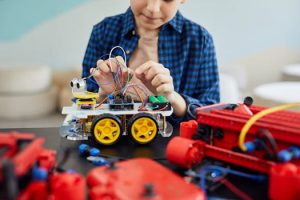Education Evolution: Preparing Students for Tomorrow
The future of education is rapidly evolving with advancements in technology, globalization, and changing societal norms. This fast-paced environment requires students to be equipped with skills and knowledge that will prepare them for tomorrow’s world. Education evolution is the process of adapting traditional education methods to meet the demands of tomorrow’s society. In this article, we will explore the concept of education evolution and what it means for preparing students for the future.
The Need for Education Evolution
Gone are the days when the sole purpose of education was to impart knowledge and prepare students for a career. Today, education must also focus on developing critical thinking, problem-solving, and communication skills. With the rise of automation and artificial intelligence, the job market is rapidly changing, and students need to be prepared for jobs that don’t even exist yet.
Technology Integration
Technology has impacted every aspect of our lives, and education is no exception. Education institutions are now embracing technology to enhance learning and teaching. Virtual classrooms, online learning platforms, and educational software are just some examples of how technology is revolutionizing education. Students need to be equipped with digital literacy skills and the ability to adapt to new technologies to succeed in the future.
Global Perspective
In today’s interconnected world, understanding different cultures and global issues is vital for students. Education evolution includes a focus on global education, where students learn about different cultures, languages, and world issues. This not only broadens their perspective but also prepares them to work in a globalized workforce.
The Shift in Teaching Methods
Education evolution has also led to a shift in traditional teaching methods. The traditional “one-size-fits-all” approach is being replaced with personalized learning methods, where students can learn at their own pace and focus on their individual strengths and weaknesses. This allows for a more tailored education experience, preparing students for the diverse and ever-changing work environment.
Multidisciplinary Learning
The future job market will require individuals to have a multidisciplinary skill set. Therefore, education evolution includes a focus on multidisciplinary learning. This enables students to develop a diverse range of skills and knowledge, making them more adaptable and versatile in their future careers.
Hands-On Learning
Practical application is essential for students to truly understand and retain information. Education evolution advocates for hands-on learning opportunities where students can apply their theoretical knowledge in practical scenarios. This type of learning also enhances critical thinking and problem-solving skills, which are crucial for tomorrow’s workforce.
The Role of Educators
It’s evident that the role of educators must also evolve to meet the demands of education evolution. Educators must not only be knowledgeable in their subject areas but also be proficient in using technology and adapting to new teaching methods. They must also be open to learning and continuously updating their skills to provide students with the best education possible.
Collaboration and Communication
Education evolution emphasizes the importance of collaboration and communication skills. Educators must foster a collaborative learning environment among students, where they can work together, share ideas, and learn from each other. This also requires effective communication skills, both in person and through digital means.
Lifelong Learning
Education is no longer confined to the school years. With the rapid changes happening in every industry, continuous learning has become essential for individuals to succeed. Educators must instill a love for learning in students and encourage them to continue learning even after they have left the education system.
Conclusion
Education evolution is a necessary step to prepare students for tomorrow’s world. It requires a shift in traditional education methods, integration of technology, a global perspective, and a focus on developing essential skills. Educators play a crucial role in this process, and their willingness to adapt and evolve is vital for the success of education evolution. By embracing education evolution, we can ensure that students are equipped with the necessary skills and knowledge to thrive in the constantly changing landscape of the future.










